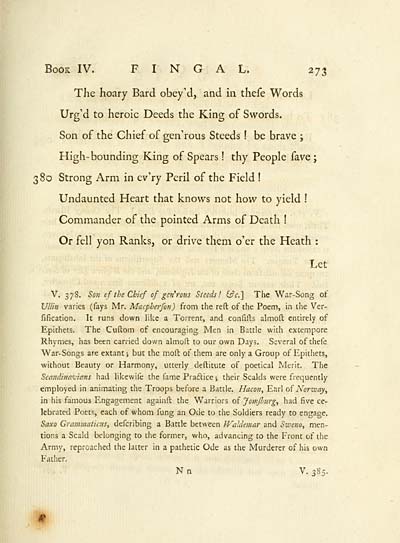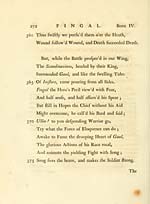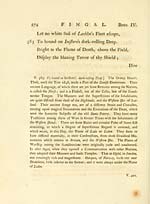Ossian Collection > Fingal of Ossian
(371)
Download files
Complete book:
Individual page:
Thumbnail gallery: Grid view | List view

Book IV. F I N G A L. 273
The hoary Bard obey'd, and in thefe Words
Urg'd to heroic Deeds the King of Swords.
Son of the Chief of gen'rous Steeds f be brave ;
High- bounding King of Spears ! thy People fave ;
380 Strong Arm in cv'ry Peril of the Field !
Undaunted Heart that knows not how to yield !
Commander of the pointed Arms of Death !
Or fell yon Ranks, or drive them o'er the Heath :
Let
V. 378. Son cf the Chief of gen' r Otis Steeds! ^c] The War-Song of
Ullin varies (fays Mr. Macpherfon) from the reft of the Poem, in the Ver-
fification. It runs down like a Torrenr, and confifts almoft entirely of
Epithets. The Cuftoin of encouraging Men in Battle with extempore
Rhymes, has been carried down almoft to our own Days, Several of thefe
War-Songs are extant ; but the moft of them are only a Group of Epithets,
without Beauty or Harmony, utterly deftitute of poetical Merit. The
Scandinavians had likewife the fame Pradlice ; their Scalds were frequently
employed in animating the Troops before a Battle. Hacon, Earl oi Norvjay,
in his famous Engagem.ent againft the Warriors oi Jomjhurg, had five ce-
lebrated Poets, each of whom lung an Ode to the Soldiers ready to engage.
Saxo GranimaticHs, defcribing a Battle between TValdejnar and Sweno, men-
tions a Scald belonging to the former, who, advancing to the Front of the
Army, reproached the latter in a pathetic Ode as the Murderer of his own
Fatlier.
Nn V. 3!J5.
The hoary Bard obey'd, and in thefe Words
Urg'd to heroic Deeds the King of Swords.
Son of the Chief of gen'rous Steeds f be brave ;
High- bounding King of Spears ! thy People fave ;
380 Strong Arm in cv'ry Peril of the Field !
Undaunted Heart that knows not how to yield !
Commander of the pointed Arms of Death !
Or fell yon Ranks, or drive them o'er the Heath :
Let
V. 378. Son cf the Chief of gen' r Otis Steeds! ^c] The War-Song of
Ullin varies (fays Mr. Macpherfon) from the reft of the Poem, in the Ver-
fification. It runs down like a Torrenr, and confifts almoft entirely of
Epithets. The Cuftoin of encouraging Men in Battle with extempore
Rhymes, has been carried down almoft to our own Days, Several of thefe
War-Songs are extant ; but the moft of them are only a Group of Epithets,
without Beauty or Harmony, utterly deftitute of poetical Merit. The
Scandinavians had likewife the fame Pradlice ; their Scalds were frequently
employed in animating the Troops before a Battle. Hacon, Earl oi Norvjay,
in his famous Engagem.ent againft the Warriors oi Jomjhurg, had five ce-
lebrated Poets, each of whom lung an Ode to the Soldiers ready to engage.
Saxo GranimaticHs, defcribing a Battle between TValdejnar and Sweno, men-
tions a Scald belonging to the former, who, advancing to the Front of the
Army, reproached the latter in a pathetic Ode as the Murderer of his own
Fatlier.
Nn V. 3!J5.
Set display mode to: Large image | Transcription
Images and transcriptions on this page, including medium image downloads, may be used under the Creative Commons Attribution 4.0 International Licence unless otherwise stated. ![]()
| Early Gaelic Book Collections > Ossian Collection > Fingal of Ossian > (371) |
|---|
| Permanent URL | https://digital.nls.uk/77606358 |
|---|
| Description | Selected books from the Ossian Collection of 327 volumes, originally assembled by J. Norman Methven of Perth. Different editions and translations of James MacPherson's epic poem 'Ossian', some with a map of the 'Kingdom of Connor'. Also secondary material relating to Ossianic poetry and the Ossian controversy. |
|---|
| Description | Selected items from five 'Special and Named Printed Collections'. Includes books in Gaelic and other Celtic languages, works about the Gaels, their languages, literature, culture and history. |
|---|

